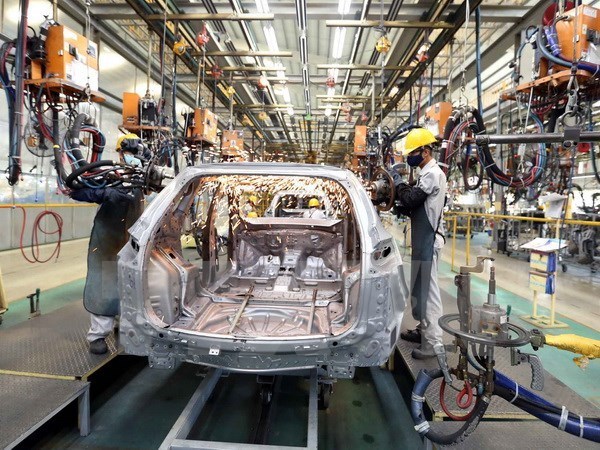
Most firms in the manufacturing and processing industry were optimistic about their production and business activities for the first quarter of 2019, according to a survey by the General Statistics Office (GSO).
Automobike frame
manufacturing in THACO factory in Chu Lai industrial park, Nui Thanh district,
Quang Nam (Photo: VNA)
More than 47.3 percent of
surveyed firms said that they anticipated better business compared to the last
quarter of 2018, and 37.8 percent expected stable business.
Only 14.9 percent forecast their business and operation would be more difficult.
The inventory of the manufacturing and processing industry sits at 64.4
percent, the lowest rate in the past three years.
Another survey of construction firms showed 59.6 percent predicted improved or
stable business in the first quarter of 2019 while the rest expected more
difficulties.
According to the Vietnam Chamber of Commerce and Industry, Vietnamese firms
were also optimistic about their business prospects in 2019 with 51 percent
saying they had plans to expand.
A recent survey by the Vietnam Supply Chain also found that more than 80
percent of surveyed firms believed 2019 would be a better year than 2018. Only
7.7 percent were worried 2019 would be worse while 9 percent were not sure.
GSO General Director Nguyen Bich Lam said business confidence had improved
significantly thanks to the stable macroeconomic situation and improved
business climate.
The number of new firms also increased for the third consecutive year to set
new records.
More than 131,000 new firms were established in 2018, an increase of 3.5
percent over the record of 127,000 new firms set in 2017.
On average, each new firm had a registered capital of 11.3 billion VND (491,000
USD), up by 10.2 percent over last year.
Firms registered to pump a total of more than 3.88 quadrillion VND into the
economy in 2018.
However, the GSO noted the number of firms temporarily halting operations rose
by a whopping 49.7 percent against 2017. The considerable rise in this number
was partly due to business registration offices nationwide conducting reviews
and eliminating firms which did not report any operations for a long time.
The number of firms which were dissolved in 2018 was more than 16,300; 91
percent of them had registered capital of below 10 billion VND.
Pham Dinh Thuy, Director of the GSO’s Industry Statistics Department, said he
believes the Government’s target of having one million firms by 2020 is within
reach. He said that as of July 1, 2018, there were already 720,000 firms.
Source: VNA
According to data from the Hoa Binh Provincial Party Committee, the industrial production index for the first six months of 2025 is estimated to have increased by 20% compared to the same period last year. This marks the highest year-on-year growth rate for this period since 2020.
In the first six months of 2025, Hoa Binh province’s export turnover was estimated at 1.145 billion USD, marking an 18.11% increase compared to the same period in 2024. Import turnover was estimated at $ 804 million, a 17.15% increase, which helped the province maintain a positive trade balance.
The lives of the ethnic minority farmers in Tan Lac district have gradually improved thanks to the new directions in agricultural production. This is a testament to the collective strength fostered through the professional associations and groups implemented by various levels of the district’s Farmers’ Union.
With the motto the "product quality comes first,” after nearly one year of establishment and operation, Muong village’s Clean Food Agricultural and Commercial Cooperative, located in Cau Hamlet, Hung Son Commune (Kim Boi district), has launched reputable, high-quality agricultural products to the market that are well-received by consumers. The products such as Muong village’s pork sausage, salt-cured chicken, and salt-cured pork hocks have gradually carved out a place in the market and they are on the path to obtaining the OCOP certification.
In the past, the phrase "bumper harvest, rock-bottom prices" was a familiar refrain for Vietnamese farmers engaged in fragmented, small-scale agriculture. But today, a new spirit is emerging across rural areas of Hoa Binh province - one of collaboration, organisation, and collective economic models that provide a stable foundation for production.
Maintaining growing area codes and packing facility codes in accordance with regulations is a mandatory requirement for agricultural products to be eligible for export. Recently, the Department of Agriculture and Environment of Hoa Binh province has intensified technical supervision of designated farming areas and packing facilities to safeguard the "green passport" that enables its products to access international markets.



